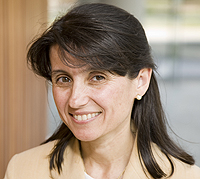FULL STORY
Einstein Scientists Receive $10-Million NIH Grant
February 26, 2009 — (BRONX, NY) — Four Albert Einstein College of Medicine faculty members were awarded a five-year, $10-million grant from the National Institutes of Health to study autophagy — a fundamental cell process that may hold the key to aging.

Ana Maria Cuervo, M.D., Ph.D. Autophagy (which literally means "self-eating") refers to several surveillance systems that all cells rely on to find, digest and recycle molecules within them that have become damaged. This cellular recycling both "cleans up" the cell and provides it with energy, since digested products can be used as fuel. Many studies have documented that autophagy becomes less efficient with age, allowing protein and other cellular components to gradually accumulate inside cells and, almost certainly, interfere with normal cell function.
The Einstein consortium is led by Ana Maria Cuervo, M.D., Ph.D., associate professor of developmental & molecular biology, anatomy & structural biology, and medicine at Einstein and one of the world's leading experts on autophagy. With the help of the NIH grant, Dr. Cuervo and her colleagues will test their hypothesis that impaired autophagy may explain the decline in organ function, weakened immunity, and other functional losses associated with aging. More specifically, the researchers will:
- look at the role of two different types of autophagy in liver and brain function as well as immunity, under normal and stressful conditions
- analyze how these two types of autophagy change as the liver, brain and immune system age
- determine how changes in autophagy that occur with age contribute to the aging of the entire organism, to the gradual deterioration of cognitive function, to the failure with age of two essential immune functions (antigen processing and presentation, and T helper cell activation and tolerance), and to abnormalities in lipid metabolism
"These studies will involve the cooperation of all four of us on the Einstein faculty who have jointly received this NIH grant," says Dr. Cuervo. The other three members of the Einstein consortium are Laura Santambrogio, M.D., Ph.D., associate professor of pathology; Fernando Macian-Juan, M.D., Ph.D., assistant professor of pathology; and Mark J. Czaja, M.D., professor of medicine.
"We're hopeful that this research project will lead to fundamental insights that will help us understand, treat or even prevent the metabolic alterations and decline in cognitive and immune function that affect us as we age," says Dr. Cuervo. "Strategies that can keep the autophagic pathways of our cells operating efficiently as we get older could help us to enjoy healthier lives well into old age."
The Einstein researchers have set up a website that describes their research effort in more detail. The URL is http://www.aecom.yu.edu/cuervo/_private/defaultPPG.htm
Other Top Stories
9/11 World Trade Center Exposure Linked to Heart Disease Among NYC Firefighters
On Becoming a Physician: New Einstein Students Receive White Coats and Stethoscopes
Novel Therapy for Acute Migraine Shows Promise in Phase 3 Clinical Trial
First Complete Wiring Diagram of an Animal's Nervous System
Multimillion Dollar NIH Grant to Help Reduce Opioid Use & Get Care to People Who Need It
NIH Grant Funds $23 Million Study of Diseases Affecting People Living with HIV
New TAILORx Data Guides Adjuvant Therapy in Younger Breast Cancer Patients
Einstein Celebrates Its 61st Commencement
Bolstering Biopsies: Testing Patients' Individual Cells to Guide Treatment



Tablet Blog